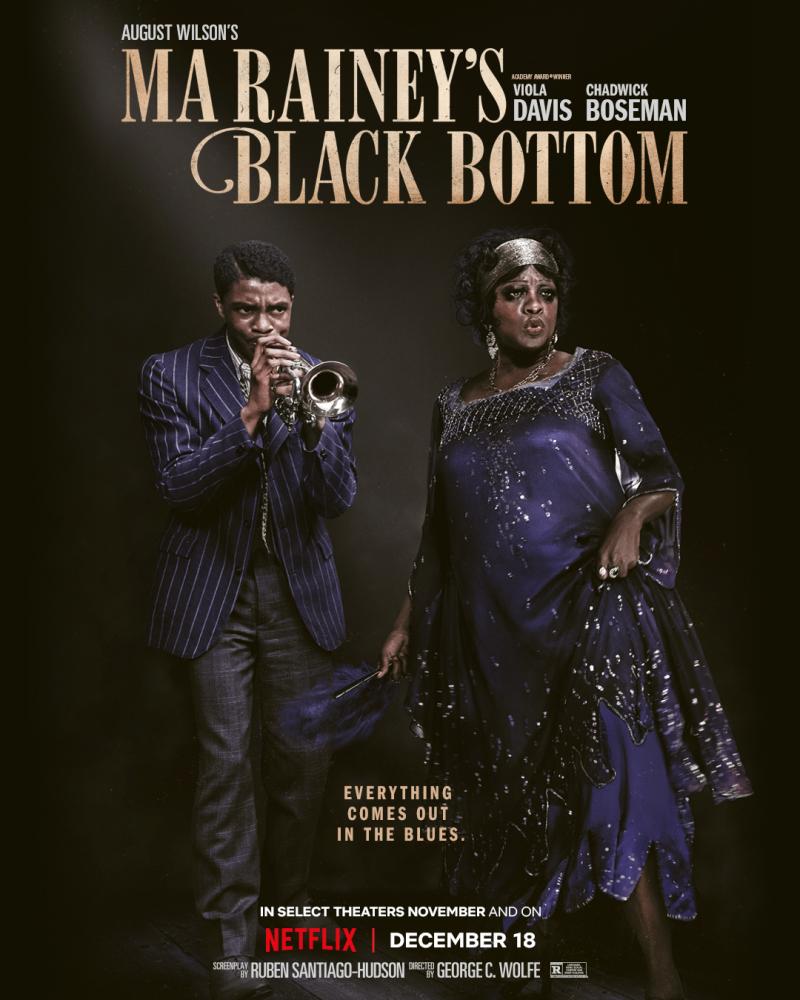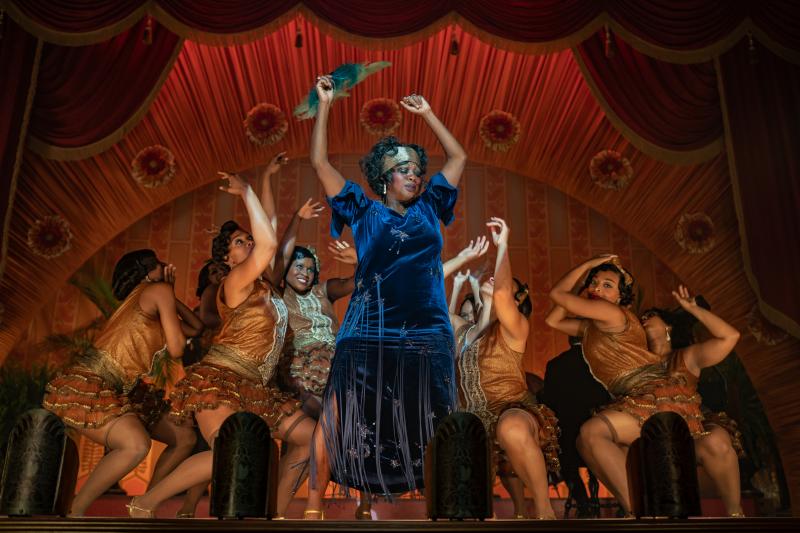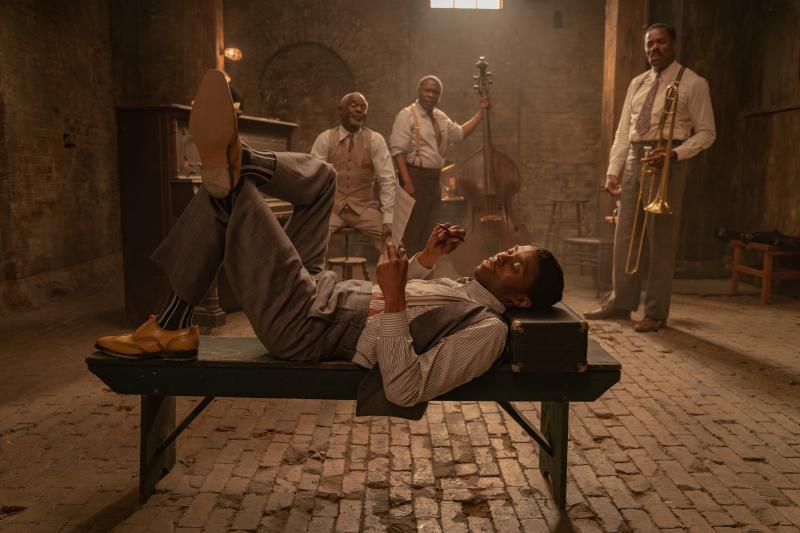Review: MA RAINEY'S BLACK BOTTOM is a Relevant and Powerful Must-See Film
The compelling film brings the play's poignant themes to stunning and visceral life.

Pulitzer Prize-winning playwright August Wilson is heralded for progressing and helping to develop contemporary black theater, tackling a wide array of important themes from the black American experience while also allowing white America to truly see black Americans. The expertly crafted 2020 film adaptation of Wilson's MA RAINEY'S BLACK BOTTOM brings this masterpiece and these still relevant themes to stunning and visceral life.
Helming the project is director, writer, and actor George C. Wolfe. He works with his star-studded cast to breathe dazzling life into the characters, allowing them to hold viewers' rapt attention with the poetry of Wilson's writing, especially in the speeches. Knowing that audiences familiar with Wilson will be waiting with bated breath for the speeches, Wolfe masterfully allows the build up to these moments to be meaningful and, more importantly, realistic. Then, when we do transition into the speeches, which often include elevated language and are laden with meaty metaphors, they still feel realistic and truly in the moment because Wolfe has deftly coached his cast to keep the speeches grounded in the character, their tangible wants and desires, and allow the words as Wilson wrote them, delivered with palpable emotion, to do their work.
The cinematography by Tobias A. Schliessler and editing by Andrew Mondshein complement Wolfe's directorial choices. The film is beautifully captured and the composition of the frame focuses the eyes of the viewer on the most important aspects of each frame. During the quick repartee moments, the camera work and editing bounce the audience from speaker to speaker without being dizzying. For the speeches, the cinematography and editing truly lift the moments up through artful closeups that convey their importance and magnitude and do an excellent job showcasing the skillful performances.

Photo by David Lee/David Lee/Netflix - © NETFLIX
Viola Davis, as the titular character, delivers an accolade worthy performance, crafting a relateably human character nestled within a larger-than-life ego. Davis' Ma Rainey knows her worth and value as a singer and performer. She also knows what her white manager and the white executives in the music industry want from her too. No fool, she accepts that her time in the limelight is as fleeting as the white men's fickle interests allow, even if they do call her "Mother of the Blues." Nothing can change that she is a double minority, and that is what drives every interaction she has with her manager and the record executive. To them, she seems egotistical and insubordinate; however, she's gaming their system because she knows it is designed to devalue and under compensate her.
Beyond being a savvy business woman, Davis' Ma Rainey has emotional wants and needs as well. With Wolfe's direction, Davis allows audiences to experience Ma Rainey as a thoughtful but jealous lover while not shying away from the historical figure's known bisexuality. The young Dussie Mae stokes the flames of love, lust, and jealousy in Davis' Ma Rainey, letting viewers witness how kind and cruel she can be, sometimes within the same moment. Likewise, we see how protective and encouraging she is as she grooms both Dussie Mae and her nephew Sylvester to be successful, even when working against systems that purposefully work to hold them down.

Chadwick Boseman in MA RAINEY'S BLACK BOTTOM (2020).
Photo by David Lee/David Lee/Netflix - © NETFLIX
Starring as Levee, Chadwick Boseman turns in a revelatory, award-worthy performance that is equally haunting and devastating. The viewer can never escape knowing that this is Boseman's final film, but even without that weight, what he delivers is richly nuanced and profound. Boseman embodies the hope and dreams of Levee while highlighting how race-related oppression and his inability to process the mental and physical trauma of racism bring about his own destruction. Boseman balances the gravitas of getting to immortalize this role on film with the power of Wilson's script to gift viewers an unforgettable performance that will leave them mulling over whether Levee is a victim of his situation or the saboteur of his own success.
As the leader of Ma Rainey's band, Colman Domingo paints a character who knows and respects his position in show business and has no plans to ruffle any feathers between booking a gig and getting paid. Glynn Turman's amiable Toledo is vibrant but scatterbrained. The audience never doubts his heart, even if we don't always follow his logic. Michael Potts is charming as the talented bassist Slow Drag. The beautiful but naive Dussie Mae is played to perfection by Taylour Paige, who crafts a character that has yet to discover her own strength and worth and is unknowingly the rope in a game of tug-of-war being played by Ma Rainey and Levee. Dusan Brown's cheerful Sylvester is a true innocent. Shielded by Ma Rainey, the audience can only see him for the boy he is. As Ma Rainey's manager Irvin, Jeremy Shamos crafts a character that is fascinatingly sycophantic to two polar opposites, which makes him remarkably two-faced and easy for both Ma Rainey and Jonny Coyne's cold, all business Sturdyvant to see through and manipulate.
Wilson's scripts are wonderfully crafted, well-paced, and structurally sound. To adapt one of his plays to the screen must be daunting; however, Ruben Santiago-Hudson has handled the herculean task with aplomb. Santiago-Hudson steps out of the way of Wilson's original script when necessary while also keenly adding ambient, tone-setting scenes that give the film a foundational base. He also adds in interstitials that remind viewers of the era, the setting, and what's happening in the world outside of the Chicago recording studio where the action occurs. For example, the film opens with Davis' Ma Rainey performing in a sold out tent in the American south before transitioning to her commanding a stage at a sold out venue in a northern city. This highlights Rainey's rise to fame while also providing a visual construct that audiences can reflect on while the characters discuss, both explicitly and implicitly, The Great Migration.
Releasing on Netflix and in select theaters on December 18, MA RAINEY'S BLACK BOTTOM will be a film event that is hard to miss. And, honestly, that is anything but bad. As a playwright, August Wilson is one of the voices that legitimized black theater in the views of mainstream, white audiences. If we are lucky, this film will further legitimize black film with mainstream, white audiences. In doing so, it'll also hopefully build conversations around fair and equal compensation for work, among others, as that particular predicament is integral to the plot and character motivations of this period piece that is still unresolved almost 100 years after this film takes place.
Reader Reviews

Videos


